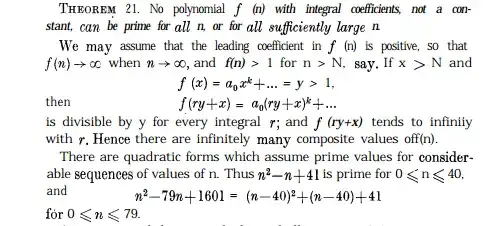From Putnam and Beyond. My question is, how does this proof work? I'd like to know more about the intuition behind its mechanics.
Prove that there is no polynomial $P(x) = a_n x^n + a_{n-1} x^{n-1} + \ldots + a_0 $, with integer coefficients and of degree at least 1 with the property that $P(0), P(1), P(2), \ldots ,$ are all prime numbers.
Solution:
Assume the contrary.
Let $P(0) = p$ with $p$ prime.
Then $a_0 = p$.
And $P(kp)$ is divisible by $p$ for all $k \geq 1$.
Because we assumed that all these numbers are prime, it follows that $P(kp) = p$ for $k \geq 1$.
Therefore, $P(x)$ takes the same value infinitely many times, a contradiction.
Hence the conclusion.
